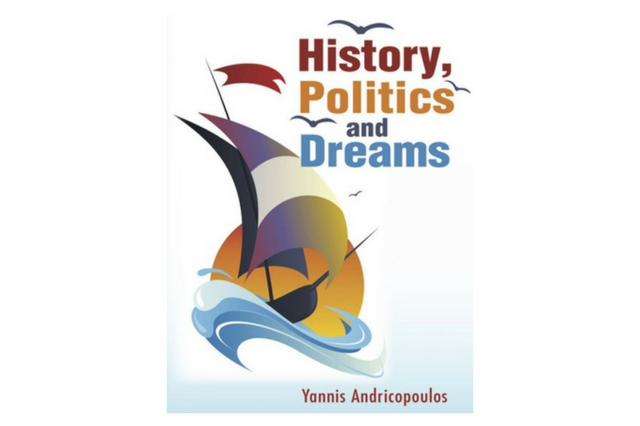Skyros Blog

A Gripping and Entertaining Story
Ari Badaines is a Skyros facilitator and group therapist - here he reviews Yannis Andricopoulos' book, History, Politics and Dreams. Yannis is the Skyros co-founder, journalist and author of several non-fiction books as well as a fiction novel due for release on 19 December.
When I was a kid (in the USA) one of my favorite TV programs was entitled ‘You are There’ and it brought to life major U.S. historical events such as the signing of the Declaration of Independence. Actors in full costume would represent the major people involved, and none other than Walter Cronkite (who would in later years become America’s most trusted newscaster) was the ‘reporter/commentator’.
Reading Yannis Andricopoulos’ book, History, Politics and Dreams reminded me so much of that program because with his personal comments, perceptions, and erudite commentary, it is very much as if you are there in 20th century Greek historical and political events. And not just hearing it from an objective reporter, but from one who adds his own interpretation with an often humorous and very personal emotional colour as well. It comes alive as does Yannis in the description of historical events of recent years in Greece and England and their influence on each other and Yannis’ life. He provides glimpses and entertaining stories of how history and politics shaped his own personal journey and his view of how society could be.
It is also a journey of personal survival in a world that often lacked caring and resources – he vividly describes his economic struggle led to feelings of despair as a new husband and then father.
Politics Begins with the Family
The author’s deep and far ranging historical and philosophical knowledge of Greece’s Golden Age allows him to bring references from that period’s culture, mythology and philosophy that illuminate the current political and cultural crisis in Greece and in the West with a very sharply focused bright light.
One of the strengths of the book lies in these literary references and his ability to bring the wisdom of ancient Greece into current Greek/UK/EU relationships and events; but, even greater power derives from the author’s own voice. And part of the richness of that voice is that it speaks openly and honestly, with a sharp eye for enriching anecdotes:
‘The Greek student movement in Europe at the time was in shambles, just like all the other Greek democratic political forces. The blow the dictatorship had administered was devastating, the omnipotence of silence deafening, and the prospect of a quick return to what would approximate normal conditions looked as unlikely as God’s chance to make a four-sided triangle. ‘’God’’. Paracelcus said, ‘’can make an ass with three tails, bu not a triangle with four sides.’’’
Andricopoulos points out that Aristotle said that politics begins with the family. The individual has to be good, because the polis depends on it, but the goodness of all is necessary for the goodness of each. Thus individual goodness was not the task of the individual alone. The polis also had to ensure that a man becomes and remains a good man. In contrast, his experiences with student unions and other groups with high ideals but were consumed by their own selfish or limited views. His view was that in recent times in the West a society emerged where ‘Greed is Good’, and selfishness and superficiality prevailed. ‘Politics, as seemed from its adytum (Go, ahead - I had to look it up too!! - A. Badaines), was based on the most immaculate conception of self interest. The politician did of course, have a view of the world in line with some convictions, commitments to some fundamental articles of faith and well-articulated concepts of the right and the good. But the whole some of their policies was almost always compromised by calculations of self-interest.
Quoting Darius, Herodotus made this point beautifully. ‘’Men’’, the Persian king said, ‘’lie when they want to profit from deception and tell the truth for the same reason’’’.
A Country Drained of its Blood
In 1989 there was a significant in flow of money from the EU, but rather than leading to wise investment that would benefit (in the case of Skyros Island) the island, the money was used to buy property in Athens. It also led to an increase in corruption and when Yannis spoke out against this on Skyros island, a local took him aside, put his arm around him as if he ‘needed sympathy after a near-death experience following an Al-Qaeda terrorist attack.’ He said to Yannis, ‘It’s all ok.....Don’t worry’.
At the end of this chapter (‘The Looting of Greece’), Yannis concludes that the bailout ‘on the one hand saved a few European banks from bankruptcy, but, on the other stifled the Greek economy and drained the country of its blood.’ And to make matters still worse, he quotes the niece of a former prime minister as saying ‘The political and financial elite is corrupt to the bone and responsible for our fate.’ But Yannis has the final touch, the final words of the chapter: ‘This as if all the others had been nice and innocent bystanders familiar with sports, food, sitcoms and children.’
The book in some ways is about history, politics, and the dreams of a better future, socially and culturally based on a new way of relating which became the foundation upon which the now well-known and highly-regarded Skyros Centre was established. It was born out of his struggle to overcome a cynical and uncaring world. He traces its philosophical underpinnings out of his wish and belief that there can be more justice, voice, and equality in society with an emphasis on being and becoming rather than the usual definitions of success.
A Cultural Revolution
The final chapter of the book is entitled A Cultural Revolution and in it Yannis gives his concise answer when asked to define his core ideas. He turns again to the classical period of Greek history and provides the same answer as did Athene to the Athenians: ‘Let your State hold Justice as its chiefest prize.’ He adds: ‘The Greek perception of Justice had its roots...in the belief that everything in the universe was interconnected within a whole’. And in a personal communication, Mr. Andricopoulos reminded me:
‘We still need to look both inwards, into our own selves that keep pulling us apart from community and nature, and outwards into the culture and the socio-political institutions that express but also fortify our disengagement from the world of values. The journey inwards is necessary as undependable individuals can never contribute to a meaningful change. Inner and outer are not two sovereign republics. They are part of the One, in constant dialogue with each other, affecting each other even when the dialogue seems to be conducted between the deaf.’
I expected this book to be a difficult read in the sense that I would have to concentrate heavily and move slowly, a bit at a time. Instead, it reads smoothly, is gripping and entertaining and I did not want to put it down - something about the personal with the historical, and the integration of ideas from Greece’s Golden Age that becomes compelling reading. Enjoy!
Would you like to read History, Politics and Dreams? Buy a range of Yannis' titles from Amazon here or give us a call on 01983 86 55 66 to order your copy directly. To find out more visit www.yannisandricopoulos.com










Comments